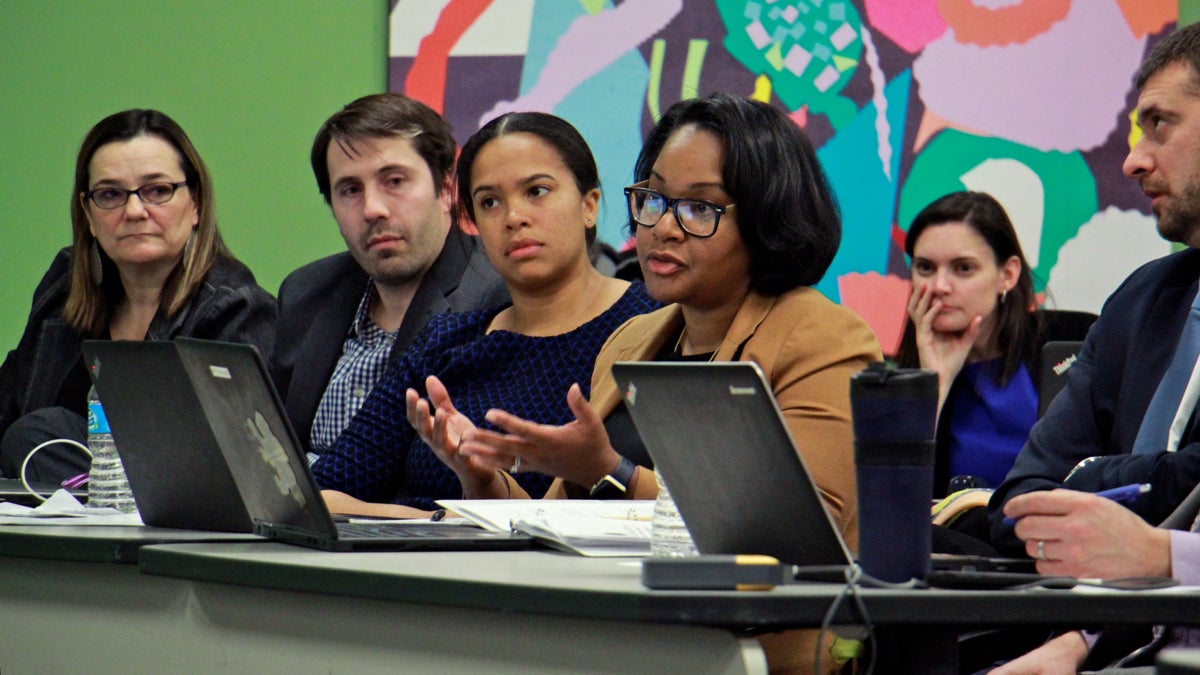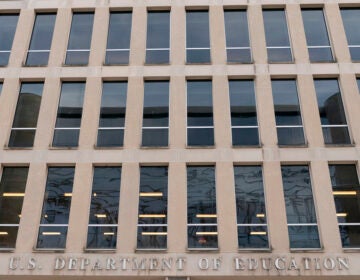Once a flood, applications for new Philadelphia charters slow to a trickle

Representatives of KIPP charter schools make their case for another charter in Philadelphia. (Emma Lee/WHYY)
Once a hotbed of charter school expansion, Philadelphia has seen charter applications slow to a trickle.
Just four organizations applied for new charters during the 2016-17 application cycle. The district has also decided not to grow its Renaissance Schools program, through which charter operators take over struggling traditional public schools.
As a result, 2017 is shaping up to be a relatively quiet one on the charter front in the city.
Two years ago — in exchange for state approval of a city cigarette tax — the district re-opened its charter process and received nearly 40 applications. Last year, 12 organizations applied for a charter.
Some charter advocates see the slowdown in applications as evidence that Philadelphia has become unfriendly to charter expansion, and that prospective applicants are steering clear rather than contend with a tougher application process.
“People are happier to see us in other places sometimes — or we feel more welcome,” said Laurada Byers, co-founder of Russell Byers Charter School and board chair of Philadelphia Charters for Excellence.
Since reopening its charter process in 2014, the School Reform Commission has beefed up its charter office while committing to a more thorough and formalized process for approving new charters. Approval rates, meanwhile, have been low.
Over the last two application cycles the SRC has received 51 applications and ultimately approved nine, a success rate of roughly 18 percent. Nationally, the charter approval rate hovers around 35 percent, according to data collected by the National Association of Charter School Authorizers.
The low odds in Philadelphia have become a deterrent for some applicants, said Byers.
“People aren’t going to try unless they know they’ve got a really good shot at winning,” she said.
Byers added, however, that she sees merit in the charter office’s more exacting approach.
“When I say that the charter office is being tougher I don’t necessarily mean that in a pejorative way,” she said.
Most agree that the charter process has become more transparent and consistent since it relaunched a little over two years ago. Some in the charter community say that’s a positive development because applicants now know what to expect.
“As a charter operator the main thing we ask from our authorizer is predictability and consistency,” said Marc Mannella, CEO of KIPP Philadelphia, which operates four city charter schools. “Tell me what the bar is and I’ll work hard to meet it.”
KIPP is the only charter operator to have applied for a new school in each of the three most recent applications cycles and has so far received three approvals. It is currently seeking the green light for a fourth location, KIPP Parkside.
At a Monday hearing, KIPP reprsentatives faced a barrage of questions from an independent arbiter as well as representatives from the SRC’s charter office. Some queries focused on inconsistencies in the application itself, such as the fact that it quoted two different figures for the square footage of the proposed new school. Other questions addressed bigger picture concerns such as the academic performance of other KIPP schools.
KIPP is part of an acclaimed, national charter network with significant resources, and some argue they are uniquely well-prepared to handle the scrutiny that now comes with applying for a new charter in Philadelphia. It’s unclear, however, how many providers, particularly small, independent ones, can successfully navigate the revamped application process.
Most in the charter community believed the 39 applications received in 2014-15 represented years of pent-up demand and would likely die down, said Manella. The question now is what the new equilibrium will and should look like. Is 12 applications a healthy amount? How about four?
DawnLynne Kacer, head of the SRC’s Charter Schools Office, believes the drop in applications for new charters doesn’t necessarily reflect a drop in charter growth or a lack of enthusiasm among charter providers. With 26 existing charters seeking renewals this year, many providers, she said, are seeking amendments that would allow them to expand rather than seeking new schools altogether.
The shift from new applications to amendment requests partly reflects the fact that the expansion process is less burdensome than the process for new schools. Overall, Kacer says, requests for new seats appear relatively consistent over the past two cycles.
“I would say that the applications are not down when you look at the totality of requests coming from the charter sector for what we would call charter sector growth,” said Kacer.
She also defended her office’s commitment to a tougher application process. Though it might seem the charter office is obsessing over small errors or inconsistencies in the applications it receives, Kacer believes those errors add up. When authorizers vet an application, Kacer said, they’re testing whether the applicant can handle the many responsibilities that come with running a public school. A sloppy application too often portends poor school management.
“I do not think it’s a fair criticism to say we are merely looking for schools to cross their T’s and dot their I’s,” she said. “We are looking for consistency.”
Some charter advocates, however, argue the charter office’s new protocols are designed to filter out as many applicants as possible and artificially restrict charter expansion.
State house speaker Mike Turzai leveled that accusation last month after the SRC’s charter office recommended against approving an application filed by a group that already runs a successful charter school in Chinatown. Turzai said the 2014 cigarette tax deal was supposed to open the door for charter growth, but wrote in a letter that he was concerned the SRC had adopted “a policy of slowing down or preventing the approval of charter schools moving forward.”
Some charter advocates theorize that the district wants to slow charter growth because adding new charter schools harms district finances. When students leave the district for charters the district no longer receives per-pupil payments for that student. They believe the SRC’s charter office isn’t vetting applicants because it wants to be thorough, but rather because it is looking out for the fiscal well-being of the school district.
“The type of technicalities they are citing feel very forced,” said Mike Wang, who heads the pro-charter group Philadelphia School Advocacy Partners. “It reeks of putting politics ahead of the interest of families.”
Kacer disagrees with that interpretation of the new authorizing process and believes her office is simply doing due diligence.
“I don’t think about politics from an authorizer’s standpoint,” she said.
WHYY is your source for fact-based, in-depth journalism and information. As a nonprofit organization, we rely on financial support from readers like you. Please give today.





